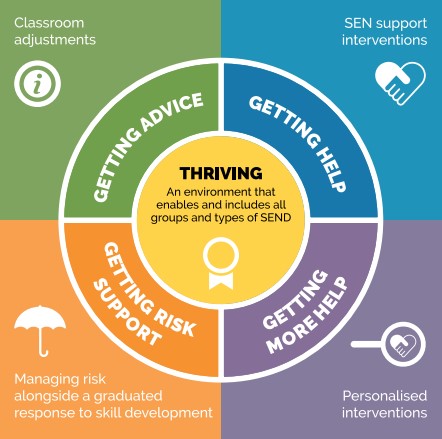Special Educational Needs & Disabilities (SEND)
Under the new Special Educational Needs (SEND) Code of Practice, September 2014, all schools have a duty to publish information on their websites about the provision they make for children with special educational needs or disabilities.
At Dane Bank Primary School, we embrace the fact that all children are different and have diverse learning needs. We make sure that we offer high quality inclusive teaching, which enables all children to make the best possible progress in school and feel that they are a valued member of the school community.
For some children, however, there are times when further additional support is needed to help them achieve their targets. Our school Special Educational Needs Co-ordinator (SENDCo) works with children, teachers, parents and agencies to ensure that our pupil’s needs are met.
The school SENDCo is Mrs Collins (sendco@danebank.tameside.sch.uk)
We understand that some children, at some point during their primary years, may need additional support to access the learning at their level. We seek to identify and assess such “special educational needs”, in consultation with parents and carers. Children may receive support individually, in small groups or through resources and equipment made available in class, and progress is monitored regularly.
supporting pupils with send across the curriculum.pdf
As well as the adaptations and provision across the curriculum outlined above, we also make use of the Tameside SEND Children Thrive document when planning our provision for children who require additional support. This resource was developed by the Tameside Educational Psychology Service in consultation with schools, settings and services and aims to provide a tool to support excellent practice across Special Educational Needs and Disability (SEND) provision in educational settings and promote positive outcomes for children and young people identified as having additional needs.
The ‘Main THRIVE Tool’ is organised by type of need and key stage.
The sections cover:
- Getting Advice (Adjustments in the Classroom) : All children receive quality first teaching. This means a range of teaching and learning styles are used and appropriate learning objectives are set for a curriculum that meets their individual needs.
- Getting Help (Targeted Interventions) : School-based interventions are put in place where necessary to enable children to work at age-related expectations.
- Getting More Help (Specialist Interventions) : For children who do not make expected progress after school based interventions school will liaise with outside agencies.
Strategies are suggestions and not a tick list and it should be the case that some children just need the first section and others need the first two and others need all three.

The document below offers an overview of services in Tameside for families to use if they need advice, help or support regarding emotional wellbeing, mental health and/or Special Educational Needs.
SEND Information Report December 2024
Dane Bank Primary SEN Local Offer
SEND Transition Booklet June 2023
SEND Engagement Model Overview 2023

